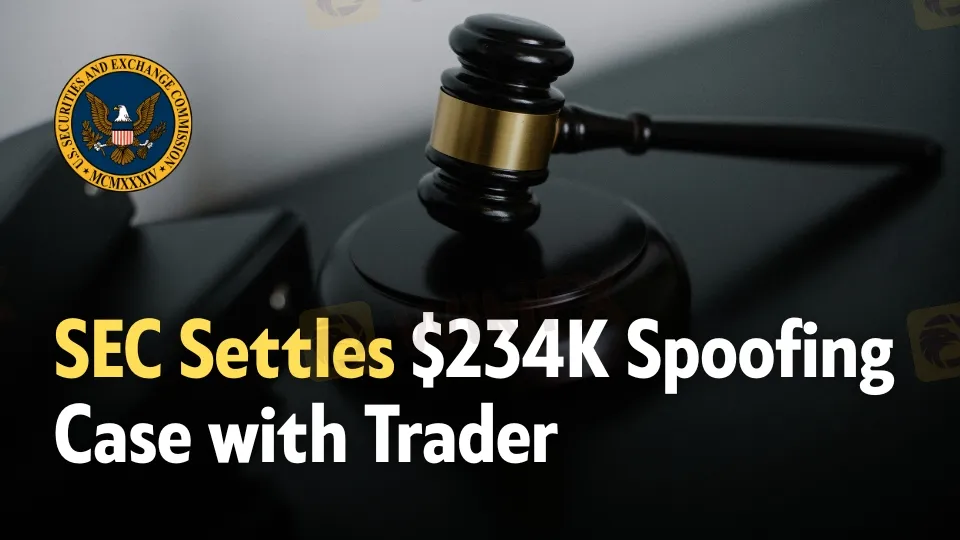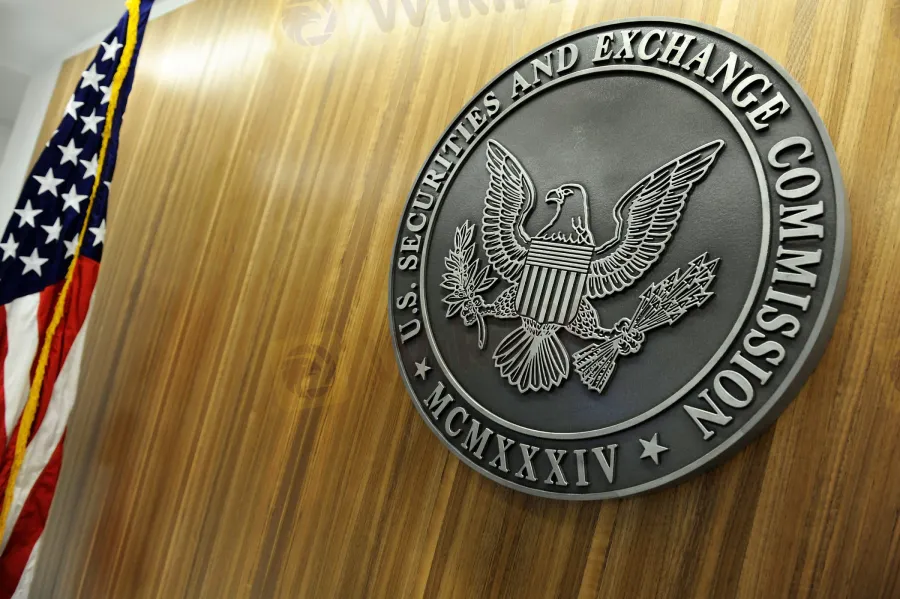简体中文
繁體中文
English
Pусский
日本語
ภาษาไทย
Tiếng Việt
Bahasa Indonesia
Español
हिन्दी
Filippiiniläinen
Français
Deutsch
Português
Türkçe
한국어
العربية
SEC Settles California Trader with Over $234,000 Spoofing Scheme
Abstract:The SEC settles with Ryan N. Cole, imposing a $234,000 fine and a five-year trading ban for spoofing in the options market, marking a crackdown on market manipulation.

The SEC has reached a settlement with trader Ryan N. Cole over an alleged options spoofing scheme that generated approximately $234,000 in illicit profits, with the deal requiring disgorgement, prejudgment interest, a civil penalty, and rare five-year SEC trading restrictions subject to court approval.
According to the SEC complaint, Cole allegedly used spoof orders in thinly traded options to manipulate the National Best Bid and Offer before executing multi-leg immediate-or-cancel orders at favorable prices influenced by his visible activity.
Cole consented, without admitting or denying the allegations, to a final judgment imposing permanent injunctive relief, $234,803 in disgorgement, $52,656 in prejudgment interest, and a $70,441 civil penalty, alongside the five-year prohibition on opening or trading in brokerage accounts without providing brokers copies of the complaint and judgment.
How the Scheme Worked
Regulators allege Cole placed large visible day-limit spoof orders across neighboring options series to create an illusion of supply or demand, tightening wide bid-ask spreads in thin markets.
When spreads narrowed, he allegedly fired multi-leg IOC orders through the complex order book—often across venues—to capture fills at prices influenced by the spoofing, then canceled the decoy orders and repeated the tactic to exit positions.
The SEC also alleges he attempted to conceal the activity from his employers compliance staff, providing evasive responses before being terminated in February 2022.

Legal Basis and Enforcement Context
While spoofing is explicitly prohibited in futures under the Dodd-Frank Acts anti-spoofing provision in the Commodity Exchange Act, the SEC brings securities spoofing cases under antifraud and anti-manipulation provisions, including Exchange Act Section 10(b), Rule 10b-5, Securities Act Section 17(a), and Exchange Act Section 9(a)(2).
The SEC‘s complaint charges Cole with violations of Section 17(a)(1) and (3), Section 10(b) and Rules 10b-5(a) and (c), and Section 9(a)(2), reflecting the agency’s securities-market approach to spoofing enforcement distinct from the Dodd-Frank Act spoofing ban in futures markets.
The case aligns with the SECs broader push to police options market manipulation, aided by cross-venue surveillance and data analytics that flag patterns such as high cancel-to-trade ratios and repeated IOC usage after visible order placement.
The Five-Year Restriction
Under the proposed final judgment, Cole would be prohibited for five years from opening, maintaining, or trading in any brokerage account in his name, family members names, entities he controls, or third parties, without first providing the broker-dealer a copy of the SEC complaint and final judgment.
This condition underscores the SECs message that individual traders—not only institutions—face aggressive enforcement when their conduct manipulates market microstructure in the options market.
Why It Matters
The settlement highlights the SECs continued focus on options market integrity and the evolving toolkit to detect spoofing-style options manipulation, even where the Dodd-Frank Act spoofing ban applies expressly to futures rather than securities markets.
For market participants, the case underscores that spoof orders described in an SEC complaint can trigger severe remedies, including injunctive relief, disgorgement, civil penalties, and multi-year trading restrictions—particularly where schemes exploit thin liquidity and complex order routing via IOC orders.
Stay tuned for the latest news from financial authorities and major regulatory bodies. Scan the QR code below to download and install the WikiFX App on your smartphone.

Disclaimer:
The views in this article only represent the author's personal views, and do not constitute investment advice on this platform. This platform does not guarantee the accuracy, completeness and timeliness of the information in the article, and will not be liable for any loss caused by the use of or reliance on the information in the article.
Read more

Juno Markets: A Closer Look at Its Licenses
When selecting a broker, understanding its regulatory standing is an important part of assessing overall reliability. For traders seeking to protect their capital, ensuring that a platform operates under recognised and stringent oversight can make all the difference. Keep reading to learn more about Juno Markets and its licenses.

Fake Trader Faces 20 Years & RM9 Million Fine for RM1.45 Mil Derivatives Scam
A Malaysian man who posed as a ‘licensed’ futures trader has been handed a 20-year prison sentence and a RM9 million fine after admitting to running a fraudulent derivatives investment scam.

Complaints Against Weltrade | Traders Can’t Get Their Money Back
Opening a trading account and watching your capital grow can feel exciting and full of promise until the moment you realise you cannot get your money back. That’s when the dream turns into a nightmare. Recent complaints submitted to WikiFX reveal an unsettling pattern seen at Weltrade where deposits vanish, withdrawals stall for days or even months, and support channels lead nowhere.

FBI Issues Urgent Warning on Crypto Recovery Scams
FBI warns crypto scam victims about fake law firms claiming to recover assets. Stay cautious to avoid further losses and protect your personal data from fraud.
WikiFX Broker
Latest News
What Is Indices in Forex? A Beginner’s Guide to Trading Forex Indices
How to Use Retracement in Trading
CySEC warns the public against 17 investment websites
Robinhood Moves Toward MENA Expansion with Dubai DFSA License Application
FBI Issues Urgent Warning on Crypto Recovery Scams
Join WikiFX’s Agent Growth Event | Turn Your Success into a Global Achievement
Forex Trends Explained for Your Successful Trading Experience
Do Kwon Faces 130-Year Prison Sentence After Guilty Plea in $40B Crypto Collapse
Best 5 Low-Spread FX Brokers in India 2025
Major Pairs in Forex: Top Traded Currency Insights
Currency Calculator


